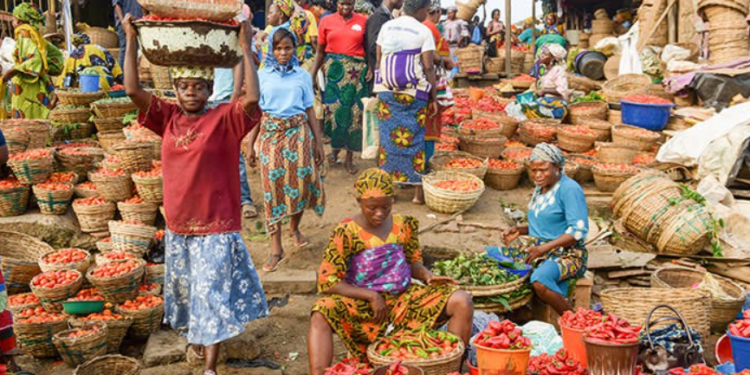Across Nigeria, the simple act of putting food on the table has become an uphill battle. As food prices skyrocket to unprecedented levels, families, traders, and business owners are forced to adjust to a harsh new economic reality. The streets buzz with one refrain: “E no easy!”
In Mararaba, a busy suburb of Abuja, Amaechi, a meat trader, watches helplessly as his business withers under the weight of soaring livestock costs. “People buy less goat meat now. It’s been bad since before Christmas,” he says, his voice tinged with frustration. The once-crowded stalls of the Orange Market along Abuja-Keffi Road now host fewer buyers, most of whom cautiously count their naira before settling for cheaper protein options like fish and eggs.
At the abattoir, Audu the butcher recalls better days when he could easily sell up to 20 goats daily. Now, he struggles to sell even half that number. “A goat lap was N4,500. Now it’s N9,000. Customers complain, but our hands are tied,” he laments. Traders echo his concerns, their livelihoods strained as consumers pull back from purchasing meat and other costly staples.

The National Bureau of Statistics (NBS) paints a grim picture: the average cost of food rose from N2,862.14 in November 2024 to N2,920.13 in December 2024, marking a staggering 91.6% increase compared to the same period in 2023. This surge affects everyday essentials like rice, garri, beans, bread, and groundnut oil, reshaping how Nigerians eat, budget, and survive.
For restaurant owners like the woman behind Anambra Kitchen in Ado, the economic squeeze is suffocating. “My regular customers don’t come anymore. I had to cut portion sizes to keep my doors open,” she confesses. Diversification has become a survival tactic, with many food vendors branching into side businesses like POS services to supplement dwindling incomes.
Customers, too, are adapting to harsh realities. John, a regular diner turned reluctant budgeter, sums it up: “We now do 0-1-0 or 1-0-0. Eating three times a day is for government officials.” This shift from three meals to just one speaks volumes about the depth of the crisis.
Economists warn that the effects of food inflation ripple far beyond kitchen tables. Dr. Paul Garau from Nasarawa State University explains, “When food prices soar, it’s not just about hunger. Reduced purchasing power slows business activity, increases poverty, and can even trigger social unrest.” His words are echoed by Puol Danladi of the Initiative for Development and Peacebuilding, who highlights the broader implications for national health and stability. “Food security is about more than availability; it’s about affordability. Without access to nutritious meals, productivity suffers, and long-term development is jeopardized,” he states.
Despite these challenges, Nigerians display remarkable resilience. Families are finding creative ways to stretch limited resources. Bulk buying from wholesalers, embracing cheaper, locally-sourced foods, and meticulous meal planning are now the norm. Mrs. Chinwe Agu from Utako shares her story: “Goat meat is a luxury now. We use awara and mushrooms. The kids don’t love it, but we have no choice.”
Community savings groups and cooperatives offer a financial lifeline. In Gwarimpa, Sarah Anjum joined a thrift group, saving N100 daily to prepare for last December’s festivities. “I saved over N500,000. It bought rice and enough goat meat for my kids to enjoy Christmas,” she recalls, her pride tinged with the struggle behind those savings.

The government has made attempts to address the crisis. In July 2024, a 150-day zero-duty levy on select food imports was introduced, targeting maize, rice, wheat, and cowpeas. However, bureaucratic delays have dulled its impact. In February 2025, efforts to reform the Bank of Agriculture aimed to boost food production and reduce dependency on imports. Finance Minister Wale Edun stresses the need for comprehensive strategies, blending fiscal and monetary policies to tackle inflation head-on.
Yet for many Nigerians, these policies feel distant and slow. The daily grind continues, marked by sacrifices and small victories. The hope is not just for cheaper food but for a future where survival doesn’t come at such a high price. Until then, the struggle endures, etched into every market stall, every empty plate, and every determined heart that refuses to give up.



